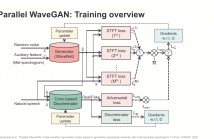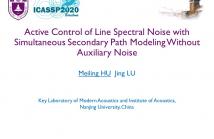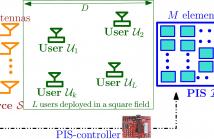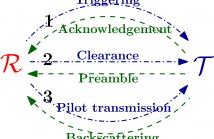
ICASSP is the world’s largest and most comprehensive technical conference focused on signal processing and its applications. The ICASSP 2020 conference will feature world-class presentations by internationally renowned speakers, cutting-edge session topics and provide a fantastic opportunity to network with like-minded professionals from around the world. Visit website.

- Read more about Robust End-To-End Keyword Spotting And Voice Command Recognition For Mobile Game
- Log in to post comments
We present an effective method to solve a small-footprint keyword spotting (KWS) and voice command based user interface for mobile game. For KWS task, our goal is to design and implement a computationally very light deep neural network model into mobile device, in the same time to improve the accuracy in various noisy environments. We propose a simple yet effective convolutional neural network (CNN) with Google’s tensorflow-lite for android and Apple’s core ML for iOS deployment.
- Categories:
 607 Views
607 Views
- Read more about Estimating Centrality Blindly from Low-pass Filtered Graph Signals
- Log in to post comments
This work considers blind methods for centrality estimation from graph signals. We model graph signals as the outcome of an unknown
low-pass graph filter excited with influences governed by a sparse sub-graph. This model is compatible with a number of data
generation process on graphs, including stock data and opinion dynamics. Based on the said graph signal model, we first prove that the
- Categories:
 24 Views
24 Views
- Read more about COOPERATIVE LEARNING VIA FEDERATED DISTILLATION OVER FADING CHANNELS
- Log in to post comments
Cooperative training methods for distributed machine learning are typically based on the exchange of local gradients or local model parameters. The latter approach is known as Federated Learning (FL). An alternative solution with reduced communication overhead, referred to as Federated Distillation (FD), was recently proposed that exchanges only averaged model outputs.
- Categories:
 9 Views
9 Views
- Read more about A Low-Latency Successive Cancellation Hybrid Decoder for Convolutional Polar Codes
- Log in to post comments
- Categories:
 9 Views
9 Views
In this paper, we study the problem of online matrix completion (MC) aiming to achieve robustness to the variations in both low-rank subspace and noises. In contrast to existing methods, we progressively fit a specific Gaussian Mixture Model (GMM) for noises at each time slot, which ensures the adaptiveness of the model to dynamic complex noises under real application scenarios. Consequently, we formalize the online MC into an optimization problem based on the GMM regularizer.
ICASSP.pdf
- Categories:
 26 Views
26 Views
- Read more about PARALLEL WAVEGAN: A FAST WAVEFORM GENERATION MODEL BASED ON GENERATIVE ADVERSARIAL NETWORKS WITH MULTI-RESOLUTION SPECTROGRAM
- Log in to post comments
We propose Parallel WaveGAN, a distillation-free, fast, and small-footprint waveform generation method using a generative adversarial network. In the proposed method, a non-autoregressive WaveNet is trained by jointly optimizing multi-resolution spectrogram and adversarial loss functions, which can effectively capture the time-frequency distribution of the realistic speech waveform. As our method does not require density distillation used in the conventional teacher-student framework, the entire model can be easily trained.
- Categories:
 220 Views
220 Views
- Read more about Active Control of Line Spectral Noise with Simultaneous Secondary Path Modeling Without Auxiliary Noise
- Log in to post comments
Online secondary path modeling is appealing for most active noise control systems due to its benefit of effective tracking of the varying acoustic environment and possible variation of the control sources and sensors. However, the usually utilized additive noise method inevitably leads to the increase of residual noise. Recently we have found that it is possible to model the secondary path without any auxiliary noise as long as the noise to be controlled is not of line spectral property.
- Categories:
 23 Views
23 Views
- Read more about Passive Intelligent Surface Assisted MIMO Powered Sustainable IoT
- Log in to post comments
Lately, Passive Intelligent Surfaces (PIS) are being recognized to play an important role in meeting the timely demand of low-cost green sustainable Internet of Things (IoT). In this paper, we focus on maximizing the sum received power among the energy harvesting IoT users by jointly optimizing the active precoder for multiantenna power beacon and the passive constant-envelope precoding based phase shifters (PS) design for PIS.
- Categories:
 37 Views
37 Views
- Read more about ENHANCING END-TO-END MULTI-CHANNEL SPEECH SEPARATION VIA SPATIAL FEATURE LEARNING
- Log in to post comments
Hand-crafted spatial features (e.g., inter-channel phase difference, IPD) play a fundamental role in recent deep learning based multi-channel speech separation (MCSS) methods. However, these manually designed spatial features are hard to incorporate into the end-to-end optimized MCSS framework. In this work, we propose an integrated architecture for learning spatial features directly from the multi-channel speech waveforms within an end-to-end speech separation framework. In this architecture, time-domain filters spanning signal channels are trained to perform adaptive spatial filtering.
- Categories:
 115 Views
115 Views
- Read more about Optimizing Backscattering Coefficient Design for Minimizing BER at Monostatic MIMO Reader Deepak Mishra
- Log in to post comments
We present a novel monostatic backscatter communication (BSC) protocol for multiple-input-multiple-output (MIMO) reader to detect signals from a single-antenna tag. Understanding tags resource constraints, it involves new preamble designing that neither requires pilot transmission from tag nor channel estimation at reader. So, considering the maximum likelihood detector, we derive closed-form expressions for the optimal detection threshold and bit error rate (BER) by exploiting practically-motivated approximations for shortrange BSC channels.
- Categories:
 30 Views
30 Views